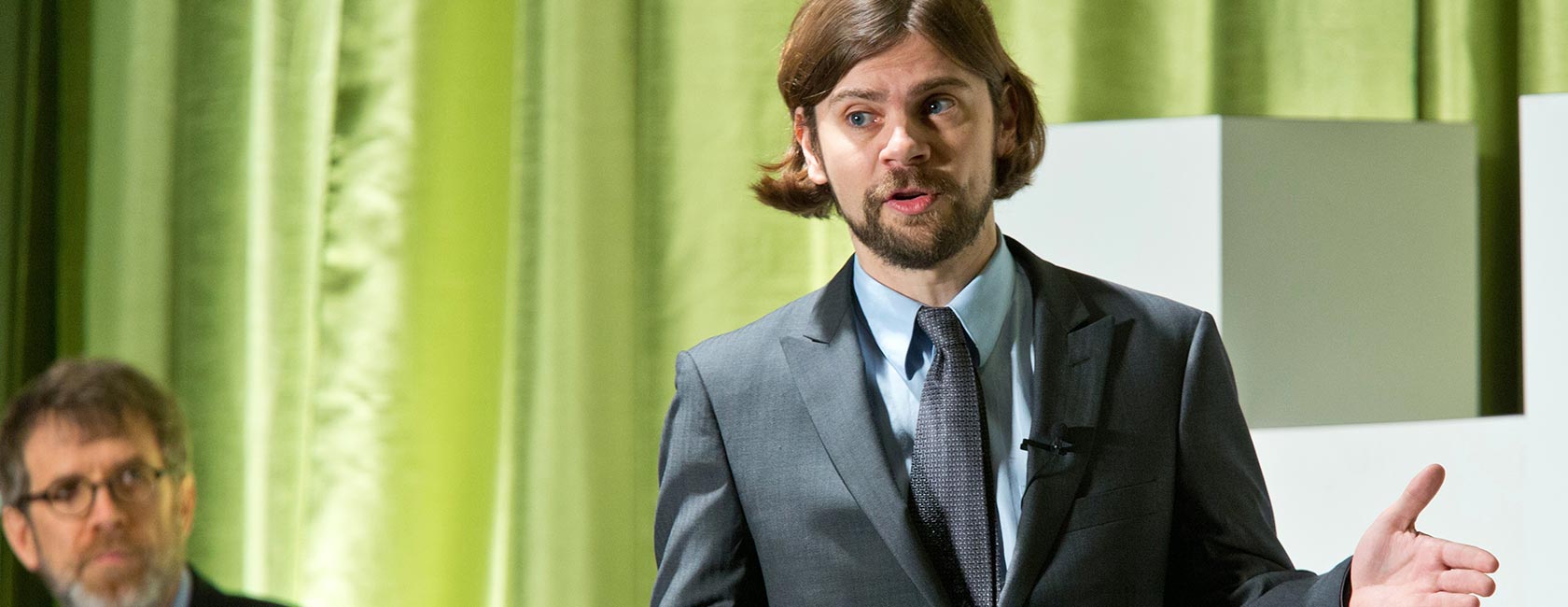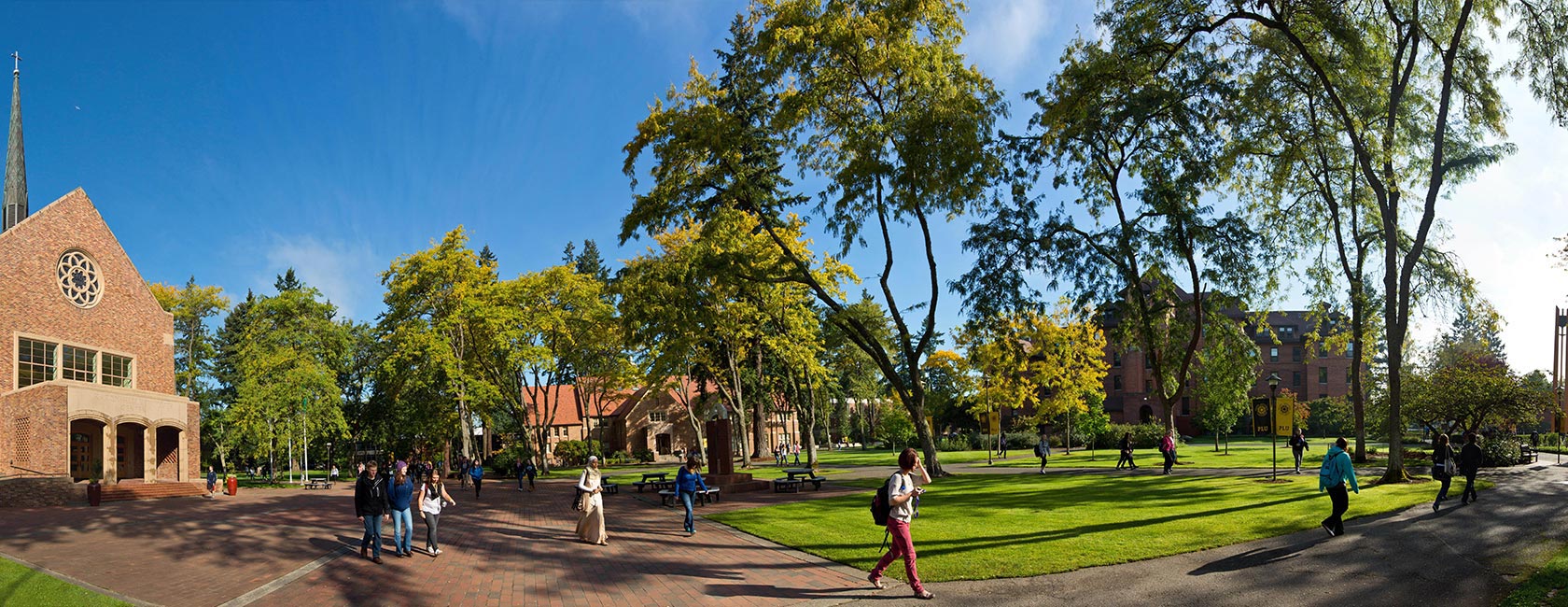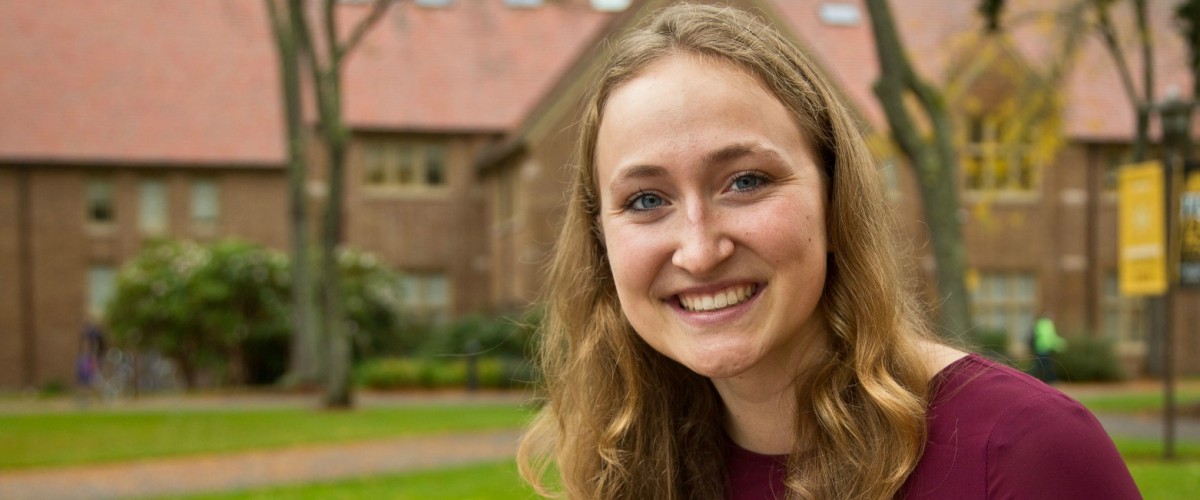A PLU Economics Degree: The First Step For Many World-Changing Lutes

Image: PLU Economics Professors Martin Wurm (right) and Neal Johnson (left) deliver an economic forecast to the Tacoma/Pierce County Chamber of Commerce. (Photo by John Froschauer/PLU)
By Zach Powers '10
PLU Marketing & Communications
TACOMA, WASH. (June 18, 2015)- PLU Economics students past and present have selected their major with a seemingly endless list of vocational sectors in mind. However, most seem to share many of the same core qualities and passions: a penchant for research, a love of data and an endless curiosity about social, political, financial and legal systems.
Economics majors from Pacific Lutheran University’s Class of 2015 showcase the value and malleability of the discipline, including two graduates who received two full-ride scholarships to law school, one who received a full-ride scholarship to study Biostatistics at the University of Pittsburg and another who will study Economics in graduate school.
In the past 20 years, 12 Economics graduates of PLU have gone on to earn Economics Ph.D.s, more than nearly any other private university in the Pacific Northwest.
One of those, 2012 Economics graduate Jordan Adamson, will visit Harvard University this week to present to the International Society for New Institutional Economics (June 18-20).
Currently a Ph.D. student at Clemson University, Adamson will present his paper, “Politics, Resources, and War: A General Theory and 900 Years of Empirics from Ancient Rome,” which asks and helps answer the question, “How do political institutions shape the incentives to go to war?”‘
Among the most convoluted of the social sciences, PLU Professor of Economics Norris Peterson explains, Economics is founded in inquiry, research and critical thinking. “Economics develops skills in taking very complex problems and breaking them down to understand them better and ultimately to help solve them,” he says.
“Economics is fundamentally a discipline in which we study how and why we make decisions,” says Associate Professor of Economics Karen Travis. “It is the wide range of applications that tends to draw a very broad pool of students, including those interested in finance or developing economies.”
“Students who are drawn to Economics ask questions for which the answers aren’t easy—poverty, health care, education, unemployment, development, environmental degradation, international relations—but for which they want to acquire the skills to help tackle them,” says Peterson, who also serves as Department Chair of Economics.
“A common quality among those drawn to Economics that I’ve seen is their immediate interest in connecting what they’ve learned in the classroom to other situations,” says Travis. “They aren’t usually the students just interested in the next test but the students who end up asking things like, ‘Well, what would the $15 minimum wage in Seattle do then?…’”
Norris says that a primary reason so many PLU Economics majors go on to successfully complete graduate degrees is the department’s rigorous Capstone experience.
“The Capstone project requires our students to get their hands dirty in real research at a fairly high level,” Peterson explains. “For some of our students, this exposure to research whets their appetite for more, and they find graduate work to be a fulfilling challenge.”
“Just a couple of weeks ago, we brought back a panel of recent alumni currently in their first post-graduate employment in investment banking, consulting, government agency and health-sector jobs,” says Peterson. “All of them spoke highly of their Capstone experience and how helpful it had been in preparing them for and securing their first job.”
Travis and Peterson say that PLU Economics professors play a very active role in helping their students to identify post-graduation academic and vocational opportunities and navigate the entrance systems that lead to those opportunities.
“As a department, we spend a lot of time with students discussing their options for the future,” says Travis.
“Working closely with all our students gives us the opportunity to get to know them, their strengths and their interests,” says Peterson.
“For students who show real academic promise and an interest in advanced training in Economics, we steer them toward acquiring the mathematics they will need to be successful in a graduate economics program,” adds Peterson. “For those interested in law school, we encourage our students to work closely with the pre-law advisor and to take a wide variety of applied courses in economics, philosophy, history, and politics. The wide exposure to theory and application in our courses is excellent preparation for the kinds of analyses they will be expected to master in law school.”
Adamson credits multiple Economics professors in helping to prepare him for his Ph.D. research and coursework. “Professors Travis and (Lynn) Hunnicutt each worked with me on independent studies, and Professor (Martin) Wurm worked with me on my Capstone project. Both experiences were useful in learning about what graduate school and research would be like. Professor Peterson taught Game Theory and Mathematical Economics, classes that were interesting and good preparation for graduate school.”
“Perhaps now more than ever, I think the world needs as many young people as possible considering the issues and dilemmas of today through the lens of Economics, which considers the implications of scarcity and choice,” Travis says. “Our students leave with the tools to successfully contribute to society in many different venues.”




